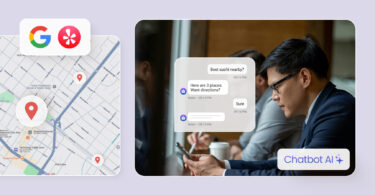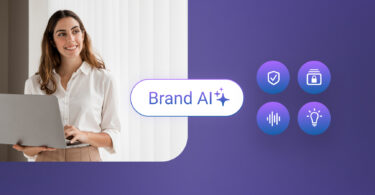In recent years, digitalization in healthcare has surged, making a seamless digital experience just as critical as the quality of care itself. Artificial Intelligence (AI) is playing a significant role in helping healthcare organizations streamline patient management, automate scheduling, and improve overall patient experience.
From managing routine administrative tasks to enhancing the quality of patient interactions, AI is reshaping the healthcare industry and empowering providers to deliver exceptional care more efficiently. The technology has enabled healthcare businesses of all sizes to gain a competitive edge by automating key processes, enhancing patient engagement, and improving operational efficiency.
This blog explores how AI can transform various aspects of healthcare—from streamlining communication to managing patient feedback—helping practices scale and improve overall patient experiences.
Table of contents
What is AI in healthcare?
AI in healthcare describes the application of Artificial Intelligence in the healthcare industry using technologies like machine learning, Natural language processing, Generative AI (GenAI), and other AI programs.
Drug discovery, medical diagnosis, surgery assistance, patient data management, automated customer service, and data analysis are just some examples of how AI in healthcare can impact the industry.
What are the benefits of using AI in healthcare?
AI in healthcare provides medical providers with accurate, streamlined support. AI systems can take on mundane tasks prone to human error. Artificial intelligence also helps medical professionals be more efficient and accurate and, ultimately, improves patient outcomes.
A recent report from McKinsey estimates that using AI in healthcare for administrative tasks and streamlining processes could help businesses save up to 9% of their total costs annually.
“AI saves us a lot of time and makes our operations more efficient. We’re using Birdeye to handle communication through multiple channels—Instagram, Facebook, text, email, and so on. There are so many different ways to communicate now, and we can’t keep hiring people to manage all of that. AI has helped us keep up with the demand without sacrificing service quality.”
Glenda Villanueva-Marchetta, Director, Marketing, Communications, and Patient Experience, New York Spine Institute
Some of the major benefits of leveraging AI in healthcare are: 1. Cost savings 2. Efficiency in operations 3. Scalability with lean teams 4. Reduced wait times with appointments
Cost saving
Healthcare costs and the cost of running a healthcare business have been significantly on the rise over the past few years. Businesses are struggling to meet customer expectations, while still running a profitable venture. As healthcare costs rise, AI helps close the gap between patient expectations and operational realities, enabling providers to reduce costs while improving care.
Businesses can:
- Use machine learning to train chatbots and reduce customer support costs
- GenAI to streamline administration tasks, and improve insurance claim management, authorizations, and so on.
- Natural language processing to spot trends and opportunities without spending a lot of resources on them.
Efficiency in operations
AI in healthcare can tackle a large volume of data from electronic health records to help healthcare providers provide accurate diagnoses and tailored treatment options.
Clinics and hospitals benefit from AI automation for tasks like generating reports, setting up reminders, and managing payments, improving the overall patient experience.
Scalability with lean teams
The U.S. healthcare system will need over 4 million more healthcare workers in the next five years to meet demand. AI helps ease this labor shortage by supporting businesses looking to expand but constrained by skill or budget limitations.
AI automates scheduling, payment processing, record-keeping, and more, helping practices scale faster and boost staff productivity.
Reduced wait times with appointment
AI can dramatically reduce patient wait times by automating scheduling processes. A study found that using AI for patient registration reduced wait times by an average of 12 minutes
Businesses can also set up an AI-driven appointment scheduling process that schedules appointments, sends reminders, and makes sure patients arrive on time, reducing overall wait times.
Birdeye – all-in-one platform
Automate Reviews, Ratings, Listings & Reputation Management with Birdeye.
11 ways to use AI in healthcare
Artificial intelligence has wide-ranging applications in the healthcare industry across all verticals. Healthcare providers can leverage AI in:
- Improving patient experience
- Managing patient data
- Review generation
- Omnichannel support
- Trend predictions
- Appointment systems
- Automating administrative tasks
- Simplifying medical documentation
- Improving healthcare marketing
- Feedback collection
- Social media marketing
Improving patient experience
The healthcare industry is rapidly growing, and patients now have the option to choose from different service providers. Guaranteeing a satisfactory patient experience is one of the few ways healthcare businesses can seek to retain their clients.
With AI, healthcare businesses can:
- Analyze their processes and make changes wherever there is scope
- Understand customer pain points from market research and model solutions accordingly
- Simplify onboarding for patients and staff by automating documentation
Johns Hopkins Hospital used predictive AI programs to create a better patient journey. A task force armed with AI data science revamped every aspect of activity throughout the hospital to improve patient experience. As a result, admitted patients got a hospital bed 38% more quickly.
Managing patient data
The healthcare system is just the latest frontier in the growth of big data. From doctors’ visits to hospitalizations to even health information from wearable tech, each patient accumulates a wealth of health data. But that data is only useful if healthcare providers can manage it right.
Clinics, hospitals, and other healthcare businesses can adopt AI technology solutions that search patient data for relevant information upon command instead of having staff manually comb through old records.
AI can help healthcare businesses:
- Find patients’ medical and billing history when they book an appointment
- Manage all insurance and payment data within a single file to avoid refilling forms
- Analyze intake forms to understand the ideal customer profile for the business.
When using AI to manage patient data, it is important to ensure that the tool is HIPAA compliant and secures the data while processing it. By ensuring your AI systems meet stringent healthcare regulations like HIPAA across all locations, you can protect patient privacy and avoid costly legal issues.
Hardin Memorial Health in Kentucky uses AI technology to pull relevant information from a patient’s record that providers can review on a single screen.
Review generation
AI in healthcare can help you increase your review rating on major channels by automating review requests to all your patients. For example, Birdeye’s Reviews AI sends automated review requests after appointments, prompting patients to leave feedback.
Often, clinics and hospitals provide excellent standards of care but miss documenting that publicly in the form of reviews. All customers need prompting to write reviews and sending them manual requests can take a toll on resources.
With AI, healthcare businesses can:
- Send automated review requests to all patients as soon they complete a transaction
- Remind patients to complete outstanding review requests
- Analyze the success of these review request emails or messages so that the business can tweak the messaging
Birdeye helps businesses improve their reputation on review sites with its robust review generation mechanism. For example, Zynex Medical went from a single one-star review to over 4,000 reviews averaging 4.5 stars in a few short years with Birdeye.
Omnichannel support
Healthcare is like any other business in many ways. Medical professionals who provide a better customer experience will be more successful. Providing support through different channels is one way to provide better service and improve efficiency.
By using Birdeye Messaging AI, multi-location healthcare businesses can
- Offer 24/7 support via text, social media, and webchat
- Set up pre-written responses to FAQs, allowing patients to access answers instantly
- Manage all conversations from a single unified inbox to streamline support
Trend predictions
AI tools can transform data into actionable intelligence, fueling business growth and informed decision-making. With data-driven insights, healthcare providers can predict patient needs and stay ahead of the curve.
Here are a few ways you can use AI in predicting trends in healthcare:
- Anticipate recurring appointments and inform patients accordingly
- Analyze hospital spending and draw accurate financial budgets
- Track and predict medical supplies in storage and trigger orders accordingly
- Reduce complications by anticipating outcomes using predictive models.
For example, The University of Texas Southwestern discovered that data science could give insight into readmissions. They used predictive analytics to identify patients more likely to face complications after discharge.
“One of AI’s key roles is data analysis, and Birdeye has really integrated it into the right places, especially insights… It’s really important to gather year-over-year insights categorized by AI, where AI can ingest all of this data and provide meaningful analysis. But the hard part is that you have to train the AI on what it’s ingesting. Thankfully, Birdeye has already set up the infrastructure.”
Steve Estevez, VP, Marketing, DermCare Management
Appointment systems
Almost all healthcare service providers rely on appointment systems to schedule resources, manage time, and help customers book a slot with them. However, you can massively upgrade your appointment scheduling processes using AI.
AI-driven appointment scheduling systems help businesses:
- Book appointments 24/7 using the AI assistant to help the patient find the right doctor and service
- Streamline and manage all appointments across multiple locations
- Plan the resource requirement based on the appointments
- Send reminders to patients to reduce wait times and cancellations
- Book recurring appointments based on the type of treatment
- Collect patient data with customized intake forms
Automating administrative tasks
Up to 30% of healthcare costs go towards administrative tasks. AI can help reduce much of this spending, while optimizing the processes.
AI can handle all periodic and repetitive tasks such as:
- Sending invoices
- Maintaining shift records
- Doctor and nurse shift scheduling
- Anticipating shortages
For example, Scheduling nursing shifts is just one administrative task that Mercy Health turned over to AI. The hospital conglomerate addressed its nursing shortage by offering flexible shifts to “gig” nurses, former full-time nurses willing to pick up shifts. Nurses can download an app to their phones and choose to work shifts that can be as short as two hours.
Simplifying medical documentation
Medical documentation is easily one of the most time-consuming tasks healthcare professionals face. Transcribing patient information into digital data is labor-intensive work, and with AI, you can divert those resources to other places.
Conversational AI can pick up key phrases and information when you talk with your patients. Generative AI can then input that patient data into the appropriate fields. All you have to do is read through the information and make minor adjustments.
AI can also help doctors create quick and efficient medical summaries for insurance claims and legal reasons.
Improving healthcare marketing
It is important for all businesses to market themselves so that the right customers can find them. This is true for healthcare providers too, especially in the current competitive environment. Using AI to guide their marketing efforts, healthcare providers can boost the success of their efforts while optimizing their budgets as well.
AI can help businesses:
- Understand their customers better by analyzing buyer personas to devise powerful marketing campaigns
- Analyze existing patient data to understand pain points and position themselves as the solution
- Analyze the success of existing marketing and advertising campaigns
- Identify happy clients via reviews and surveys to promote loyalty and referral programs
Feedback management
Often, the key to success is right in front of us, and we miss it. That’s what happens when healthcare providers neglect the mountain of feedback they receive every day. This feedback holds the key to knowing what is going right and what is going wrong for your service.
Healthcare businesses must leverage AI in customer feedback management to:
- Send automated surveys to all customers and collect feedback on all their processes. This includes onboarding, diagnosis, treatment, follow-up, and payment
- Analyze customer feedback to pull out actionable insights for growth
- Identify unique selling points of the business to use them in marketing materials.
You can automate surveys with Birdeye’s Surveys AI to collect feedback on key processes.
Social media marketing
Customer communication channels are changing and the impact is now visible in the healthcare industry as well. Patients now like to research potential service providers on various channels including social media before booking an appointment.
It now becomes important for businesses to build and maintain a strong social media presence on these platforms. However, consistently posting content, engaging with users, and answering questions can be resource-intensive. But not with AI.
Using AI-driven social media management tools like Birdeye Social AI helps business:
- Generate post ideas for their platforms that help them build a strong following
- Monitor social media engagement and respond to customers on different platforms from a single easy-to-use dashboard
- Market their brand using positive reviews garnered on popular review sites
- Respond to customer queries using an AI assistant
How to leverage AI in healthcare with Birdeye
Birdeye is an AI company focused on helping your multi-location healthcare business excel in today’s dynamic landscape. With BirdAI, its advanced AI engine, Birdeye is committed to enhancing patient experiences and enabling smarter, data-informed decisions.
Here’s how you can transform your healthcare business with Birdeye:
1. GenAI Communication
Messaging: Birdeye Messaging AI provides secure, round-the-clock patient support across multiple channels from a centralized inbox. It drafts and refines responses, ensuring fast and accurate communication.
Automated responses: Birdeye Chatbot AI handles routine inquiries, schedules appointments, and manages other patient interactions seamlessly.
2. Enhanced reputation management
Review responses: AI helps you craft friendly, relevant replies to online reviews with a single click. Serve multilingual patients effectively by translating reviews and responding in their preferred language.
Review widgets with AI summaries: Use AI-generated summaries to showcase top reviews in a website widget, giving visitors a clear view of your practice’s strengths.
Review analysis: Summarize patient feedback across reviews to understand what’s working and identify improvement areas. Insights AI scores reputation across locations, and Competitors AI benchmarks your performance against competitors.
3. Actionable data insights
Patient feedback analytics: Gain insights into patient sentiment and preferences from surveys and reviews with advanced analytics from Birdeye Insights AI.
Custom reports: Generate clear, actionable reports tailored to support strategic decision-making.
4. Personalized patient engagement
Survey analysis: Use Birdeye Surveys AI to deploy surveys, then rely on AI to generate concise summaries of responses. Quickly analyze feedback to uncover valuable insights.
Omnichannel engagement: Connect with patients on their preferred channels, including email, SMS, and more.
5. Building a strong social presence
Streamlined publishing: Effortlessly create, publish, and schedule personalized content across multiple locations and platforms with Birdeye Social AI.
Patient engagement: Receive real-time alerts whenever a patient reaches out on social media, and use AI to respond quickly.
6. Consistent online presence
Accurate listings: Measure and improve the accuracy of your online listings with Listing Score from Birdeye Insights AI.
Enhanced Local SEO: Boost your local SEO with Birdeye Listings AI through data-driven insights, SEO-friendly business descriptions, and detailed performance tracking.
7. Competitive intelligence
Competitor analysis: Birdeye Competitors AI identifies competitors by industry and location, giving you a comprehensive view of your market position.
Competitor benchmarking: Track competitor reviews in real-time with Birdeye Reviews AI and benchmark your online reputation using GenAI-powered summaries.
SWOT analysis with Insights AI: Use Birdeye Score to compare performance, conduct a GenAI-powered SWOT analysis, and track trends over time for you and your competitors.
Social media analysis: Use competitor AI to gain insights into competitor social media performance, including real-time posts, publishing behavior, and top-performing content.
“We’ve started using AI-powered response tools… Using Birdeye gives us great ideas and insights that we hadn’t thought about, which really reduces the amount of time and effort that we need to spend trying to craft a good response. And we really do want to reach out to folks and make sure they feel heard, especially when they’re sharing some of the challenges that they’ve had.”
Steven Greer, Co-Owner & COO, Genesis Counseling Center, Inc
FAQs about AI in healthcare
From medical imaging to diagnostics to treatments, AI touches every facet of healthcare. Medical providers can use AI to schedule appointments, manage patient communications, and grow their online reputation.
AI can solve issues in patient journey, fiscal management, resource management, and diagnosis by streamlining care, reducing errors, and supporting healthcare providers.
One example of AI in healthcare is healthcare providers using artificial intelligence technology to automate appointments and patient communication.
Work with Birdeye to leverage AI in healthcare
The future of AI in healthcare is here. And the healthcare AI industry will grow 20-fold within the decade. Artificial intelligence will reduce healthcare costs and improve patient outcomes.
AI will also reduce human errors, deliver insights, and all-around improve patient care to help healthcare practices grow successful.
Use Birdeye’s AI-powered tools for patient communications, scheduling, reputation management, and insights. Contact us today.

Originally published


![[Feature image] Competitive intelligence tools- The definitive guide for 2025](https://birdeye.com/blog/wp-content/uploads/Feature-image-Competitive-intelligence-tools-The-definitive-guide-for-2025-375x195.jpg)



![[Feature image] The best AI tools for business in 2025 A complete guide for productivity, content, and growth](https://birdeye.com/blog/wp-content/uploads/Feature-image-The-best-AI-tools-for-business-in-2025-A-complete-guide-for-productivity-content-and-growth-375x195.jpg)


